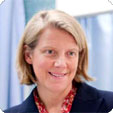
According to the most recent recipient of Cancer Council Victoria's Edward ‘Weary' Dunlop Fellowship, Associate Professor Clare Scott, the greatest motivation for a cancer researcher is to treat cancer patients.
"When a patient is asking for help, you want to be able to provide a treatment that goes directly to the cause of their cancer and when this is not available, you are driven to spend time in the lab trying to develop a targeted treatment," she says.
Associate Professor Scott's particular interest is ovarian cancer, the seventh major cause of cancer mortality in Australian women. It's a particularly challenging cancer to treat, as there are no effective screening tools and no treatments targeted to the specific molecular drivers of the various types of ovarian cancer.
The funding provided by the Dunlop Fellowship — a total of $1.5 million over 5 years — will enable Associate Professor Scott to develop new mouse models to explore the genetic factors driving the behaviour of various types of ovarian cancer and to explore innovative treatment strategies.
Her work will build on internationally-recognised research from the Australian Ovarian Cancer Study, identifying the different molecular subtypes of epithelial ovarian cancer.
It is an approach that has been very successful in understanding related cancers, such as breast cancer, leading to improved outcomes for Victorian cancer patients.
Associate Professor Scott says her research would not be possible without the generous support of the donors whose contributions have made the Dunlop Fellowship possible.
"The type of work required to unlock the secrets of ovarian cancer takes time and money - it takes one to two years to establish the models we will be working with and three years to analyse the findings.
This would simply not be possible without the significant, long-term funding available through the Dunlop Fellowship," she says. "In addition, the prestige associated with the Dunlop Fellowship is invaluable in driving collaborations with other researchers that underpin the cuttingedge nature of this work. My team at the Walter and Eliza Hall Institute and I are enormously grateful to Cancer Council Victoria supporters who have made this Fellowship possible."
Associate Professor Scott Clare joins Professors David Vaux, Andrew Roberts and Grant McArthur as recipients of the Dunlop Fellowship.
Fast facts
-
360 Victorian women are diagnosed with ovarian cancer with 220 dying from it each year.
-
It is predominantly a disease of older women with 40% of cases found in women aged over 70.
-
Survival over 5 years has increased significantly from 34% in 1985-1989 to 40%.